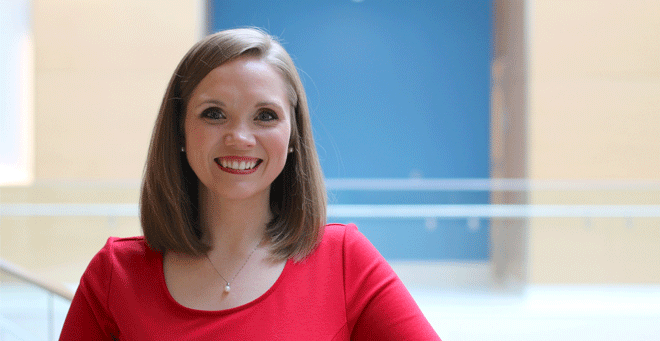 |
|
|
Telana N. Fairchild, MSN, RN |
Graduate School of Nursing class speaker Telana Fairchild, MSN, personifies the promise and potential of the Doctor of Nursing Practice degree she will receive at Commencement 2016 on Sunday, June 5.
“The DNP program has increased my confidence as a leader,” said Fairchild. “As a DNP you learn how to take evidence and research and apply it to clinical practice. We are the resource for how to implement what is currently being shown to change patient outcomes.”
Fairchild liked helping people even as a young child, and recalls wanting to be a nurse since taking eighth grade aptitude and interest tests on which she scored highly for teaching and nursing. Further inspired by her mother, who returned to school for an associate’s degree and became a registered nurse while Fairchild was a young teen, Fairchild has traveled the entire nursing career path to reach the terminal DNP degree.
“I was able to help her study, and got very interested in what she was learning, so she encouraged me in high school to get my certified nursing assistant license,” said Fairchild. “It got me off to a good start. Working in home health at the entry level of care clinched it for me.”
Fairchild received her Bachelor of Science in Nursing at the University of North Carolina Wilmington in 2007 and worked as a cardiovascular and cardiothoracic intensive care nurse at Duke University Hospital and Tennessee Medical Center until a job opportunity for her husband, who has a PhD in chemistry, brought them to Massachusetts. Here Fairchild continued working as an ICU nurse at UMass Memorial Medical Center before enrolling in the four-year BSN to DNP program in 2012 and giving birth last year to their daughter, now nine months old.
Since completing the Master of Science in Nursing requirements and becoming licensed as a family nurse practitioner in 2014, Fairchild has been a primary care provider at Kids on the Common Pediatrics in Grafton, working part-time while continuing her doctoral studies. Following Commencement, she will return to full-time work, enabling her to put her newly acquired DNP knowledge and skills to use in staff development and management along with caring for her patients.
Even before graduating, Fairchild found she could apply what she learned in class to her practice. “Once I realized I had staff buy-in on a project to help us utilize our electronic health records to their fullest capacity, I realized how important it was for me to be involved with other staff development issues,” she said. When Fairchild approached the pediatrician who owns the practice to propose expanding not only her hours but also her role, she embraced the idea.
Fairchild credits her earliest experience providing care as a CNA with informing her current commitment to staff training and development. “It gave me a respect for each one of the levels coming up the chain, a perspective of what it takes to be in that role and that it is a demanding job, and if you don’t help support your techs and patient assistants as a nurse, your patients aren’t well cared for,” she said. “My education through the DNP opened my eyes that this was something our practice needed.”
The future holds many more professional opportunities for the newly minted doctor of nursing practice. Another strong motivation Fairchild had for earning the DNP was gaining the credentials to teach other advanced practice nurses. She has already enjoyed precepting master’s level students while practicing part-time as a DNP student, and anticipates continuing to precept GSN students at Kids on the Common, as well as returning to the GSN to present invited guest lectures.
“DNP training teaches you how to help others learn as well as learn from others,” Fairchild said. “In nursing we embrace being lifelong learners.”
Related links on UMassMedNow:
First BSN to DNP graduates are health care pioneers
Mock codes provide nurses with real-life training